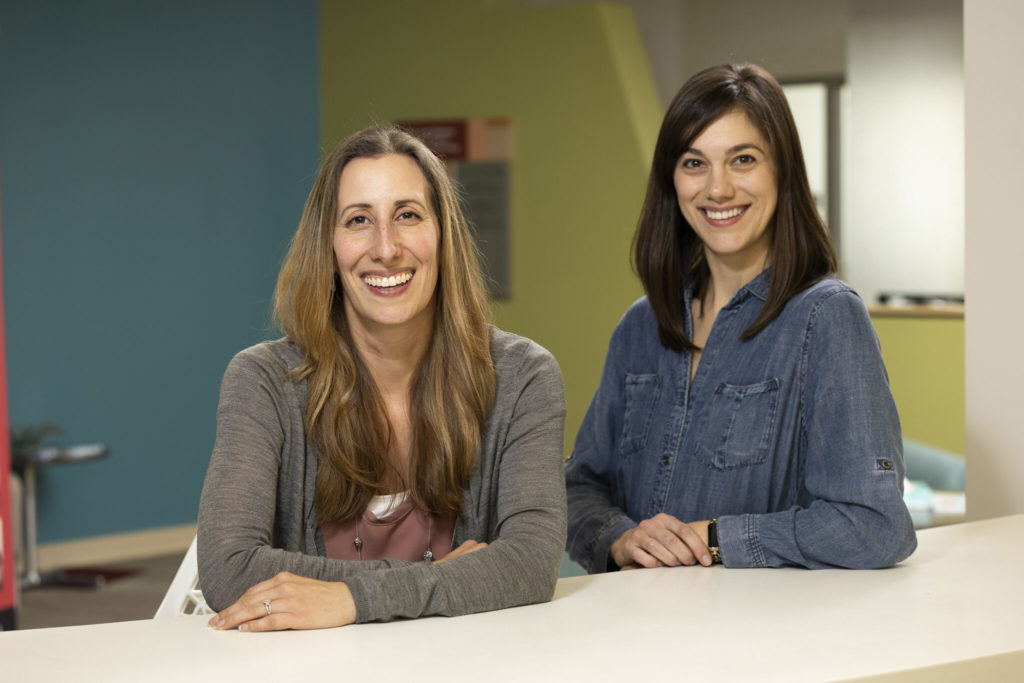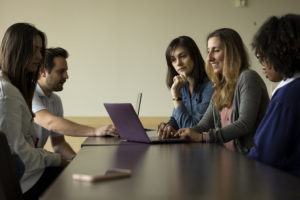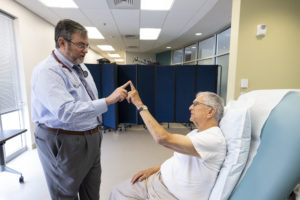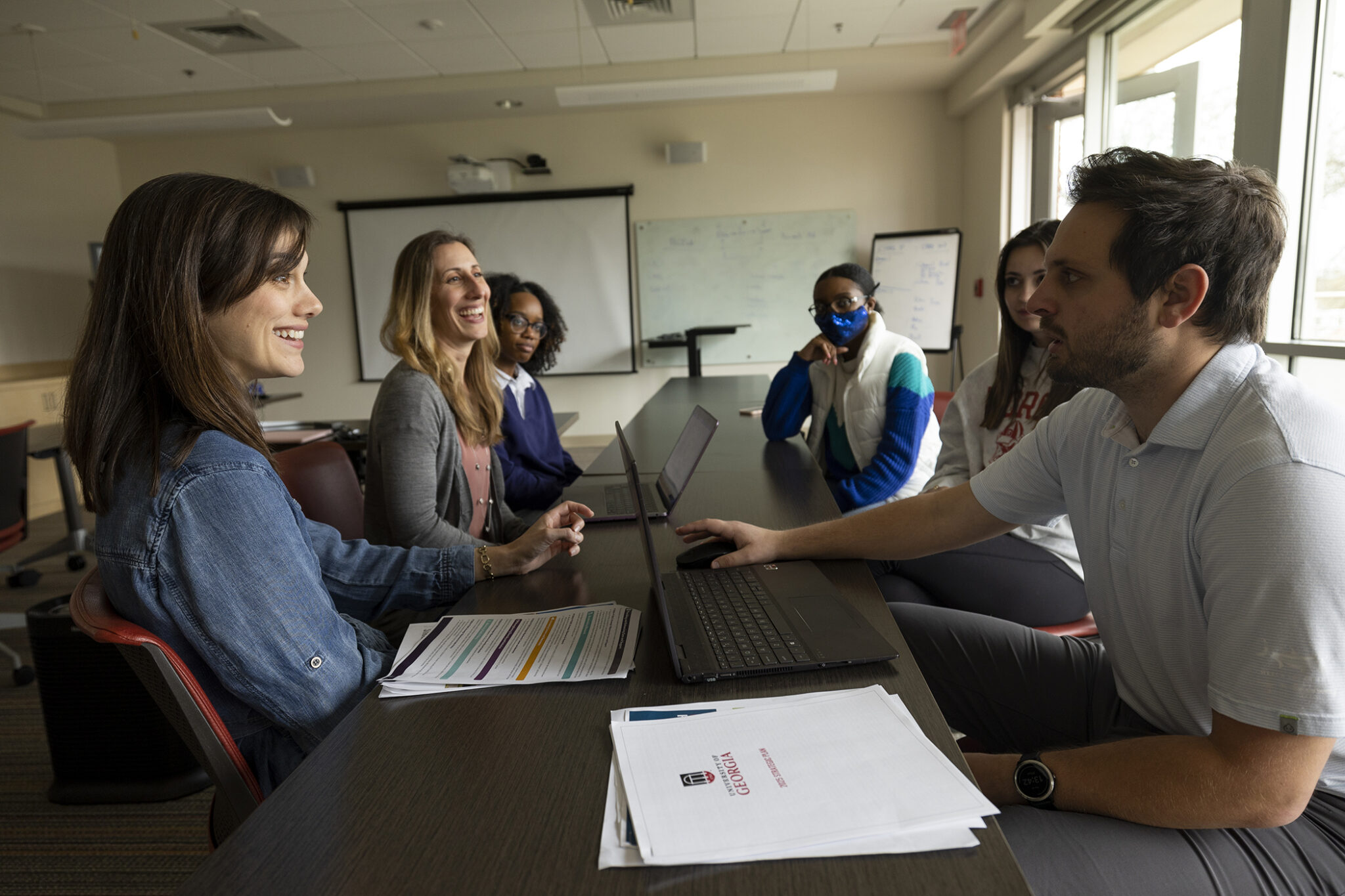The CARE Center, housed in UGA’s Institute of Gerontology, provides resources and telehealth options to improve quality of life.
Lisa Renzi-Hammond remembers the last months of her grandmother Evelyn’s life in flashbulb moments. For 10 years, Alzheimer’s disease had steadily chipped away at Evelyn’s memory and executive functioning until she needed full-time care.
On her last visit to Renzi-Hammond’s house in Georgia, Evelyn stood in the hallway peering into her granddaughter’s face, her hair as fiery red that day as it had always been. But she couldn’t recall who Renzi-Hammond was.
“It was heartbreaking,” said Renzi-Hammond.
This was the woman who had called her honeybunch and bought her sparkly things and dangly earrings when she was a little girl. And now here her grandmother stood, unable to recognize her.
Jenay Beer was there once, too. It took some time for Beer and her family to realize something was going on with her 80-year-old grandmother, June, who lived in another state.
“She declined rapidly, and when we were notified by a family friend that there might be an issue, things weren’t looking good for her. Her kitchen wasn’t stocked. Her home was a mess. She wasn’t keeping up with herself, and we felt awful because we didn’t know these health changes were happening,” remembered Beer.
When they first joined the Institute of Gerontology at the University of Georgia College of Public Health, Renzi-Hammond and Beer were pursuing individual lines of research focused on helping people live better as they age.
Renzi-Hammond studies how diet and lifestyle can prevent neurodegenerative diseases like dementia. Beer specializes in assistive technologies that could help older adults, in particular those with cognitive impairment, and their families cope with health challenges.
They talked about their work and talked about their shared history with Alzheimer’s and dementia.

(L-R) An environmental portrait of associate professors Lisa Renzi-Hammond and Jenay Beer of the Cognitive Aging Research and Education (CARE) Center at the Institute of Gerontology.
Over time, the seed of an idea began to form, an idea to innovate Alzheimer’s and dementia care – to combine the best of prevention education, care technologies and post-diagnosis support in one place and make it accessible to people beyond the borders of the UGA campus.
In 2019, the Cognitive Aging Research and Education Center, or CARE Center, was born – a promise, they said, to their grandmothers.
Beer and Renzi-Hammond are now leading a multi-disciplinary team of UGA scientists and health professionals who are working to ensure that any Georgia resident facing an Alzheimer’s or dementia diagnosis can get the care and support they need.
It matters where you live
More than 6.5 million Americans today are living with Alzheimer’s disease or related dementia, a number that is expected to double in the next 30 years. These individuals face a mountain of challenges managing a complex disease that will alter their behaviors, relationships and ability to function normally.
On top of that, they are navigating a health care system that’s not set up to help everyone equally. Currently, the bulk of dementia-related health care is provided in the state’s major cities.
“Rural health care systems often lack the neuroimaging equipment, cognitive testing tools and advanced laboratory facilities needed to diagnose and treat Alzheimer’s and dementia, so the CARE Center is creating infrastructure and addressing economic barriers to diagnosis,” said Beer.
Across the U.S., rural communities are losing doctors, clinics and pharmacies. In an environment drained of resources, many remaining providers have turned to telehealth as a way to connect with specialists.
Renzi-Hammond and Beer plan to use telehealth in the same way, but first, they needed to build a team to offer the high-quality, wrap around services they wanted to offer.

(L-R) Staff member Taylor Leathers talks with graduate student Hal Mansour, associate professors Jenay Beer and Lisa Renzi-Hammond and research assistant Hannah Huff as they work on the strategic plan for the Cognitive Aging Research and Education (CARE) Center at the Institute of Gerontology.
In short time, they brought on board Don Scott, associate professor of medicine and campus director of geriatrics and palliative care at the Augusta University/University of Georgia Medical Partnership; Bernadette Heckman, a professor and director of clinical training in the department of counseling and human development services at the Mary Frances Early College of Education; and Larry Sweet, psychology professor and director of the Clinical Neuroscience Laboratory in the Franklin College of Arts and Sciences.
Together, these faculty and their graduate students began offering cognitive assessments to individuals who could travel to the Institute of Gerontology, where the CARE Center is housed, on UGA’s Health Sciences Campus.
To date, the team has assessed 14 patients and helped their families through the next steps of treatment and support care. And they can already see an impact, not only in connecting clients to diagnostic services, but in helping them reframe how they conceptualize the next years of their lives.
“To see someone on the scariest day of their life and give them options and say, it’s going to be OK, this is a decade of life, and there are opportunities to do things – those conversations are empowering,” said Renzi-Hammond.
Getting access to Alzheimer’s research
At the same time that they were building clinical capacity, Beer and Renzi-Hammond were developing a curriculum to educate communities and health care providers about Alzheimer’s and dementia prevention and the need for diagnosis.
In a recent survey by the Alzheimer’s Association, 80% of older adults don’t know the early signs of Alzheimer’s or dementia, so they miss an opportunity to identify risk factors and catch the disease early when treatments are most effective.
Health care providers are another critical audience, said Renzi-Hammond. Getting local doctors, nurses and pharmacists on board will help foster communication about cognitive health and disease prevention, and these are the clinicians who may one day be referring patients to the CARE Center.

(L-R) CARE Center Medical Director Dr. Don Scott gives a physical exam to patient Tom Oliver of Athens, Ga in a clinical room at the Cognitive Aging Research and Education (CARE) Center at the Institute of Gerontology.
To help get that curriculum in front of rural communities and providers, they turned to specialists at UGA’s Cooperative Extension. With offices serving all 159 Georgia counties, Extension offers an array of programs, services and health education that support local businesses and families.
In 2022 the CARE team started training Extension agents on Alzheimer’s and dementia topics – like spotting the early signs of dementia or eating well to prevent cognitive decline – that they could fit into existing nutrition and wellness programs, and the team has created tailored curricula and resource guides to reflect the needs of those communities.
The road ahead
Renzi-Hammond said collaborating with communities will be key to the success of the CARE Center.
“They tell us, this is what we have here and this is what we’re missing here. Then it’s our job to bring the might of UGA to solve that problem. We’re not holding our resources here. We want them distributed where the need is greatest,” she said.
And soon, that will include access to Alzheimer’s and dementia services using telehealth.
“The idea is not that you drive four hours to get specialty services and wait a year,” said Beer. “Instead, you can walk right into your local UGA facility – your Archway Partnership office, your Extension office, or even your local doctor’s office if they want to participate, and connect immediately to somebody who can help, who has the expertise to do that job, in a place that feels comfortable.”
Back at the CARE Center, the duo reflects on the road ahead.
With support of grants, including one from the National Academy of Medicine, and seed grants from UGA as part of the Rural Engagement Faculty Workshop and Presidential Interdisciplinary Seed Grant programs, they hope to launch the telehealth arm this year and continue building their post-diagnosis support to include more financial, legal and traditional counseling services.
And Renzi-Hammond can’t help but think about what her grandmother, Evelyn, would make of their work.
That day standing in her home, Evelyn had said, “I don’t know you, but I feel like I can trust you.”
“Some relic of me was present in her head, and I’m glad she thought that she could trust me even when she didn’t know me. There are so many people in the world going through this, and they may have no one that they could trust,” said Renzi-Hammond.
If all goes to plan, there will be that someone, someone who cares, for everyone in Georgia.
Connecting with rural counties
Christa Campbell knew Elbert County needed to join forces with the CARE Center as soon as she learned about it.
“I feel it’s important, and there are a lot of people out there who don’t even know about the resources out here or the importance of having your loved one specifically tested,” said Campbell, who has served as a family and consumer science extension agent in Elbert since 2008.
Campbell knows firsthand how life-changing this effort could be.
In 2020, she lost a close personal friend to Alzheimer’s, a man who was like a father to her. She said it would have helped to know all that she knows now about the signs and symptoms of dementia, how to get a diagnosis and what resources are available – either locally or through UGA – to support families medically and financially.
“We haven’t really done a lot around aging populations, so this is kind of a new territory for us,” said Denise Everson, family and consumer sciences program development coordinator for northeast Georgia, but the CARE curriculum was a natural addition to their current programming because “a lot of the things that we do in Extension around wellness is focused on prevention and preventing chronic disease.”
They also began meeting with four rural counties participating in UGA’s Archway Partnership program. These communities were immediately receptive to the CARE initiative, and they are currently working to identify what Alzheimer’s and dementia education and care resources they need. The team is set to begin meeting with two new Archway communities this year.
Getting plugged into existing initiatives where there is momentum around health issues ensures that there’s community support for the work the CARE team is trying to do.
Campbell helped introduce the CARE team to members of Elbert Partners for Health, a local coalition of community stakeholders working to improve health for Elbert County residents. That group is planning to hold a focus group to gauge interest from local medical facilities in partnering with the CARE Center to host diagnostic services.
And she sees some immediate ways the education the CARE Center has provided can fit into local events and health screenings that are already going on throughout the year.
“It’s just amazing to me the work that they’re doing around this and how it could truly trickle out into the counties where it’s really needed,” she said.
Read story at UGA Today.
– Lauren Baggett
Posted on March 30, 2022.







